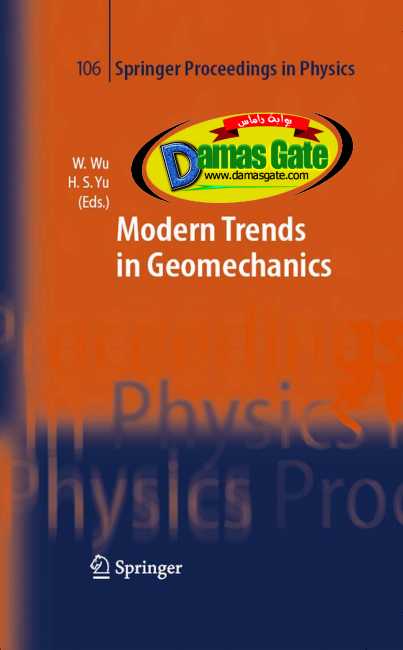Modern Trends in Geomechanics

1 Introduction
Some of the earliest applications of energy arguments to develop conceptual
models for the behaviour of soils, sands and other geomaterials are those establishing
stress–dilatancy relations due to Taylor [35] and Rowe [31]. The
original formulations of the Cam Clay, critical state models was based upon
concepts of the plastic dissipation of energy. More recently, energy arguments,
based upon the laws of thermodynamics have been used to establish general
procedures for constitutive modelling [37]. One of the best known thermomechanics
formulations is due to Rice [29]. However this has a built in “normality
structure” and is not appropriate for frictional geomaterials which commonly
exhibit non-normal flow rules. Here we use the line of development described
in the books by Ziegler [40], Maugin [21] and papers by Collins and Houlsby
(1997) and Houlsby and Puzrin [18], who coined the term “hyper-plasticity”
for this approach. The characterizing feature of the hyper-plastic approach is
that the complete elastic–plastic constitutive behaviour, including yield conditions
and flow rules, can be determined from two thermomechanical potentials,
the free energy and the dissipation rate.
Download
*

1 Introduction
Some of the earliest applications of energy arguments to develop conceptual
models for the behaviour of soils, sands and other geomaterials are those establishing
stress–dilatancy relations due to Taylor [35] and Rowe [31]. The
original formulations of the Cam Clay, critical state models was based upon
concepts of the plastic dissipation of energy. More recently, energy arguments,
based upon the laws of thermodynamics have been used to establish general
procedures for constitutive modelling [37]. One of the best known thermomechanics
formulations is due to Rice [29]. However this has a built in “normality
structure” and is not appropriate for frictional geomaterials which commonly
exhibit non-normal flow rules. Here we use the line of development described
in the books by Ziegler [40], Maugin [21] and papers by Collins and Houlsby
(1997) and Houlsby and Puzrin [18], who coined the term “hyper-plasticity”
for this approach. The characterizing feature of the hyper-plastic approach is
that the complete elastic–plastic constitutive behaviour, including yield conditions
and flow rules, can be determined from two thermomechanical potentials,
the free energy and the dissipation rate.
Download
*